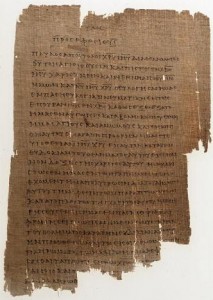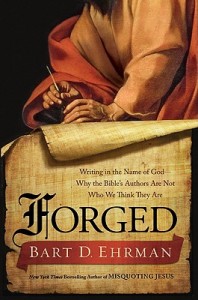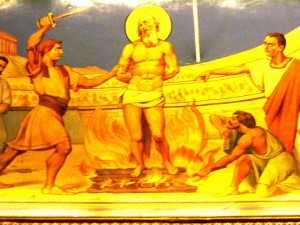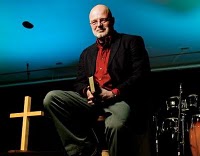 In the first century, letters were written with a reed pen using ink made from soot, gum and water on to 9 1/2” x 11” papyrus sheets which could hold around 150–250 words.[1] Since even Paul’s shortest letter, Philemon, contained 335 words, all of Paul’s letters joined the papyri sheets to form a scroll. Because this was an expensive and labor intensive process, one could ill afford false starts. Due to this and the general lack of education, trained scribes called amanuenses were frequently employed for writing letters.[2] For example, from Romans 16:22 we learn that Tertius was Paul’s amanuensis. Similarly, Peter tells us in 1 Peter 5:12 that he used Silvanus as his secretary. It also appears to be standard operating procedure for the actual author to compose a final salutation in his own hand (2 Thess. 3:17; Gal. 6:11).
In the first century, letters were written with a reed pen using ink made from soot, gum and water on to 9 1/2” x 11” papyrus sheets which could hold around 150–250 words.[1] Since even Paul’s shortest letter, Philemon, contained 335 words, all of Paul’s letters joined the papyri sheets to form a scroll. Because this was an expensive and labor intensive process, one could ill afford false starts. Due to this and the general lack of education, trained scribes called amanuenses were frequently employed for writing letters.[2] For example, from Romans 16:22 we learn that Tertius was Paul’s amanuensis. Similarly, Peter tells us in 1 Peter 5:12 that he used Silvanus as his secretary. It also appears to be standard operating procedure for the actual author to compose a final salutation in his own hand (2 Thess. 3:17; Gal. 6:11).
A crucial issue to New Testament scholarship is the degree of freedom an amanuensis had in vocabulary and style. It seems natural that the more trusted and familiar the relationship, the more editorial the role. According to Carson and Moo,
Many scholars think that the influence of various amanuenses may explain the differences in Greek style among the Pauline letters, rendering it difficult, if not impossible, to draw conclusions about authorship based on such criteria.[3]
This is a vital yet overlooked fact in modern authorship disputes. Still yet, even highly critical scholars must face this issue as a potential defeater to their arguments. A prime example being Bart Ehrman, who in his sensationalistic book Forged acknowledges, “Virtually all of the problems with what I’ve been calling forgeries can be solved if secretaries were heavily involved in the composition of the early Christian writings.”[4] It seems entirely feasible, if not likely, that they were.
Many modern scholars argue that some New Testament books might be pseudonymous. Pseudonymity refers to the practice when a writer purposefully attributes someone else’s name to a document. Pseudepigraphy refers to the documents which are believed to be falsely attributed.[5] Sometimes the author likely thought that by attaching a well-known name to a work, it had a better chance of being taken seriously. Other times there was indeed mal intent as in the case of the Acts of Pilate which blasphemously slandered the character of Jesus.[6] Other possible explanations which have been offered include students honoring a leader posthumously or even for reasons of personal safety in the face of unpopular polemics.[7] While some books are better evidenced than others, left wing sensationalists like Ehrman attach the pseudepigaphal label to more accepted New Testament books like Acts. The term “forged” usually refers to a counterfeit of something which already exists. In this case, its more marketable than “pseudonymous.” While scandalous titles like Forged or Misquoting Jesus generate sales, they present a disingenuous portrait of the New Testament. While scholars may argue, none of the New Testament books are proven to be pseudonymous. There are excellent defenses for traditional authorship of every book presented in the New Testament introductions by D.A Carson and Douglas Moo or Thomas D. Lea and David Alan Black referenced in this essay.
The church fathers that were responsible for selecting the cannon were particularly interested in authorship. For example Eusebius writes, “Paul’s fourteen epistles are well known and undisputed. It is not indeed right to overlook the fact that some have rejected the Epistle to the Hebrews saying that it is disputed by the Church of Rome, on the ground that it was not written by Paul.”[8] Of course, today Hebrews is considered anonymous as it is not officially attributed to any author. The book makes no claim. This distinction is paramount in that no deception is perpetrated. In contrast, the Epistle to the Laodiceans was ascribed to Paul but the Muratorian Canon refers to it as “forged in Paul’s name.”[9]
Furthermore, there were many works attributed to Peter such as the apocryphal Gospel of Peter. Eusebius also records the work of an early apologist Serapion who wrote, “For we, brethren, receive both Peter and the other apostles as Christ; but we reject intelligently the writings falsely ascribed to them, knowing that such were not handed down to us.”[10] Similarly, Tertullian rejected the book, The Acts of Paul, not only by its heretical content but due to its doubtful authorship.[11] In general, the books were thoroughly examined based on orthodoxy and authenticity of authorship.[12] It seems clear that the early church would never knowingly accept a forged book as canonical.
The onus is on those who uphold the idea that the writing of pseudonymous letters was an accepted practice among the early Christians to produce some evidence for their view. On the contrary, the evidence we have is that every time such a writing could be identified with any certainty, it was rejected. (Carson and Moo, 344)
The ethics of Jesus and the apostles were decidedly partial to integrity and transparency. It seems likely that those early Christians with serious concerns for truth and piety, being far more contemporaneous to the era of authorship, got it right. Modern scholars who want to revise history are not in such a position and have questionable motives. Erhman’s own confession that the use of amanuenses potentially overthrows all of his indictments consigns his own work Forged to a questionable genre.
[1]Thomas D. Lea and David Alan Black, The New Testament : Its Background and Message, 2nd ed. (Nashville, Tenn.: Broadman & Holman Publishers, 2003), 335.
[2] Lea and Black, The New Testament, 334.
[3]D. A. Carson and Douglas J. Moo, An Introduction to the New Testament, Second Edition (Grand Rapids, MI: Zondervan, 2005) , 335.
[4]Bart D. Ehrman, Forged: Writing in the Name of God–Why the Bible’s Authors Are Not Who We Think They Are (New York: HarperOne, 2011), 134.
[5]Carson and Moo, An Introduction, 337.
[6] Carson and Moo, An Introduction, 338.
[7]Lea and Black, The New Testament, 338.
[8]Eusebius, Church History, 3.3.5.
[9]Peter Thomas O’Brien, The Letter to the Ephesians, The Pillar New Testament commentary (Grand Rapids, Mich.: W.B. Eerdmans Publishing Co., 1999), 41.
[10]Eusebius, Church History, 6.12.3.
[11]Lea and Black, The New Testament, 340.
[12]Lea and Black, The New Testament, 341.







